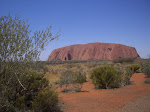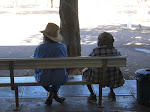Beautifully carved desert animals, bowls, music sticks, boomerangs, shields, clubs and spears hand made by the Aboriginal people from the south east and west of Central Australia can be seen at the Cultural Centre at the base of Uluru. Use the links at the end of this post to visit the Maruku Web-site were you can learn more about these people and their art.

Maruku is a craft company, owned and controlled by Anangu (Aboriginal people from the south east and west of Central Australia). Maruku's warehouse is based within the Mutitjulu Community and its retail outlet at Uluru - Kata Tjuta Cultural Centre at the base of Uluru.
Maruku is the trading arm of the Anangu Uwankaraku Punu Aboriginal Corporation set up in 1984, which literally means wood belonging to Anangu.
Maruku assists craftspeople throughout the Anangu (collective name of Pitjantjatjara, Yankunytjatjara and Ngaanyatjara speaking people) lands by coordinating the marketing and promotion of their work and providing them with essential support services and advice.

Desert people have been producing their traditional weapons and utensils for tens of thousands of years. The technique of carving animals and incising them with burnt wire decoration is much more recent, as are the adapted crafts of woodwork and painting.
The missions stimulated animal carving and other woodcrafts, particularly at Ernabella and Fregon, and by the 1950s the decorated carving tradition was well known in many communities.
Craftspeople were urgently seeking support and encouragement for the maintenance of their traditional skills, some guarantee of fair prices and a reliable purchasing and selling centre for their work. They hoped that such a centre could facilitate a reasonably priced supply of materials and artists tools, and that help could be provided with packing and storage.
Eighteen communities spread over an area similar in size to Victoria now own and are serviced by Maruku Arts. These include Amata, Indulkana, Fregon, Ernabella, Mimili, Docker River, Pipalyatjara, Kalka, Wingellina, Blackstone, Jameson, Warburton, Warakuna, Tjukurla, Kanpi, Nyapari, Finke, Mutitjulu and many smaller homeland centres.
The Maruku bush truck visits each community on a regular basis, craftspeople are paid cash for their work and can buy tools from the truck. The visits also give Maruku employees the opportunity to talk to the crafts people about the operations of Maruku and any new ideas that the craftspeople might have.
There are approximately 800 craftspeople who contribute work to Maruku Arts on a regular basis, this artists co-operative is thought to be the largest of its kind in Australia.
The Maruku warehouse usually has in stock more than 30,000 pieces of craft for resale. At times items may be in short supply, if the demand is extreme.
 Maruku Gallery, Uluru-Kata Tjuta Cultural Centre |
|
|
C.M.A. Ininti Store Ayers Rock, NT 0872 Australia |

We were thinking and thinking, always thinking as we were carving, and learning, and I decided to make a carving like a ngintaka (perentie lizard), making its feet and hands, carving its head and a long tail and it turned out really well.
I then used wire to burn the walka (design) on it, we were just learning this skill. Later we used it to decorate wira - small bowls - just like our grandmothers had made in the past.
After this we began to talk about how best to make the craft and to take it to places where we could sell it. And we've taken it to exhibitions where many people have bought a lot of punu, which is really wonderful.
Topsy Tjulyata
Use these links to view and/or purchase crafts from the Maruku web-site

















Your article is very helpful. you can visit my website.
ReplyDeletexe döviz çevirici
I love your article. you can visit my website Swords and Souls Mod Apk
ReplyDelete